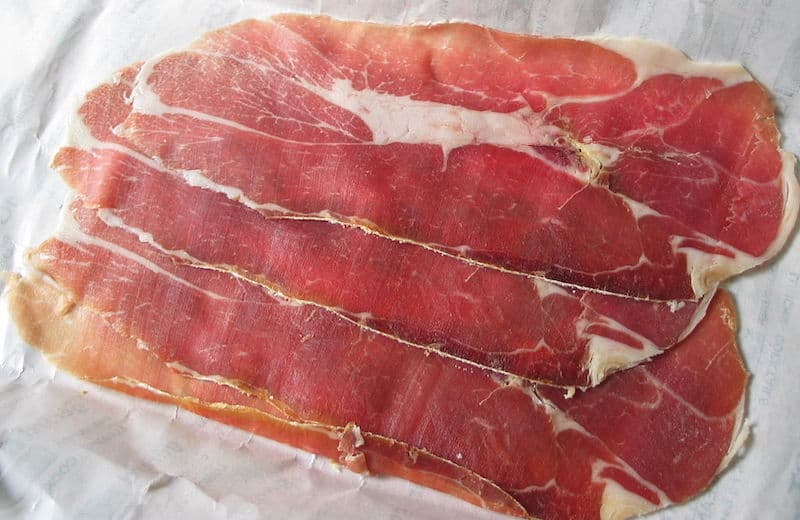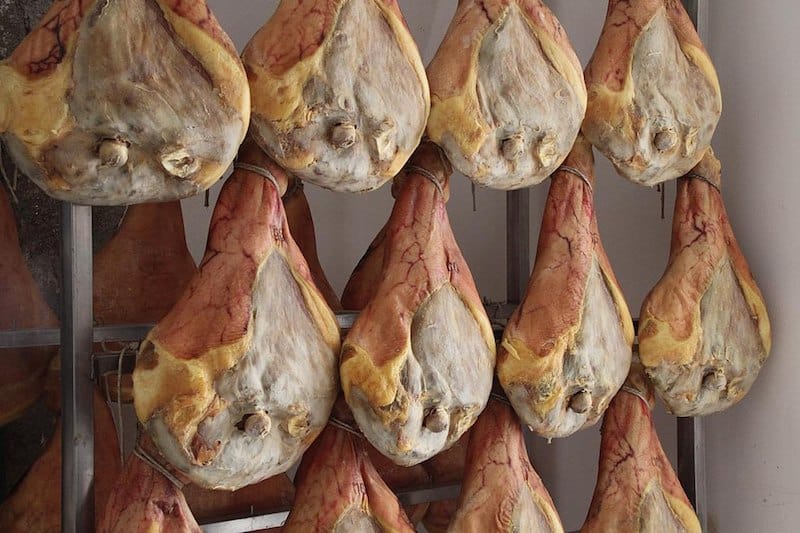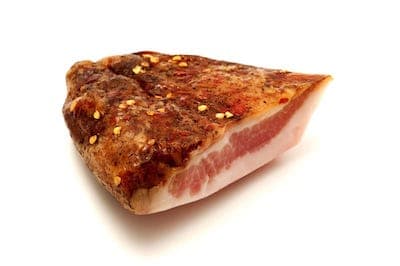Help! My Prosciutto Tastes Like Blood!
Mother Nature has given us a protective mechanism. If we don’t like the taste or smell of food, we shouldn’t eat it.
For example, many people feel uncomfortable consuming meat that has a metallic flavor resembling blood. So if you’re wondering why your prosciutto tastes like blood and whether it’s safe to eat, let’s see what the deal is.
While the reasons why prosciutto tastes like blood are many, none of them are hazardous. Sometimes, dry-cured meat tastes that way because the blood didn’t fully drain. In other cases, the issue lies in the type of salt used during the curing process. Finally, the taste may not be down to the meat, but rather an underlying health condition with whoever is consuming the product.
In this guide, I’ll explain whether it’s okay for prosciutto to taste like blood. Afterward, I’ll list the five most common reasons why prosciutto may have a metallic flavor and how to deal with it. Then, read on to find out if your prosciutto is safe to eat.
Is It Okay for Prosciutto to Taste Like Blood?
Properly prepared prosciutto should have a delicately sweet and salted taste with a tender texture.
Cured prosciutto must have a rich pinkish or brownish deep red color, while cooked prosciutto should be pale pink.
The only inclusions that should be present in high-quality prosciutto are thin, fat streaks. So, ideally, prosciutto shouldn’t taste or smell like blood (or ammonia).
However, there are several reasons why prosciutto may have a metallic flavor. Some are related to the meat itself, others to the person’s health conditions consuming the meat.
The good news is that none of the reasons are dangerous.
Reasons Your Prosciutto May Taste Like Blood
Now, let’s look at the most common reasons prosciutto tastes like blood and solve the issue.
1. Iodized Salt
Iodized salt is commonly known as table salt. If you’re making the prosciutto yourself and are using it instead of coarse salt during curation, this may be the reason.
Iodized salt contains an anti-clumping agent that makes it so runny. This chemical has a distinct metallic taste often associated with blood.
It may stay unnoticed by most people, though those with especially sensitive tastebuds will sense it. Professional cooks never use regular table salt for this very reason.
Generally, iodizing salt is excellent to put on a table if someone prefers more salty food than others. In this case, adding a bit of table salt won’t hurt the taste.
But if you’re using large amounts of iodizing salt to cure meat for extended periods, the metallic flavor will be very noticeable. Thus, try switching table salt to coarse or kosher salt.
2. Myoglobin
If you’re tasting blood in prosciutto that has already been cooked, it’s likely myoglobin, a protein that transfers oxygen in muscle cells; its structure is similar to that of hemoglobin.
Myoglobin only has a metallic taste when meat isn’t cooked thoroughly. The issue is, it needs to be heated for longer to decay than other blood cells.
If you need to cook prosciutto for the recipe, try doing it with an immersion circulator. The trick is to cook the prosciutto at a low temperature but for a long time.
Afterward, sear the meat in a preheated skillet for a few minutes. This will add crispiness and ensure that no myoglobin is left.
Optionally, you can get rid of myoglobin by additionally brining the prosciutto in salt. Sure, the prosciutto is already salted, but sometimes store-bought variations aren’t cured or brined for long enough.
So instead, salt prosciutto liberally from all sides and leave uncovered in the fridge for about 12 hours. Then, take it out, rinse, and dry.
3. Prescription Drugs or Health Conditions
Some prescription drugs and infections may cause you to taste something metallic in all or some foods. Some of these drugs include tetracycline, allopurinol, and lithium.
If you’re taking any medications at the moment, check with your doctor whether this may be one of the side effects.
As for health conditions, plenty of them may affect the way we taste food. Some are minor, such as cold, others much more concerning, such as dementia.
Thankfully, checking whether that’s the case is simple – get someone else to taste the prosciutto and ask their opinion.
4. Not All the Blood Has Drained
Prosciutto is dry-cured meat. Despite the common misconception, cured meats aren’t cooked.
Traditionally, ham is gently pressed during the curing process to drain all the remaining blood. However, some prosciutto may not be drained completely.
Prosciutto that has been quality certified by Italian governing bodies shouldn’t have any blood left in it. You can recognize such meat by either a crown logo with ‘Parma’ inside or by a ‘DOP’ sign.
However, the blood in prosciutto is entirely safe to consume. Salt is a natural preservative that slows down the growth of microorganisms. Plus, all excess water necessary for thriving bacteria is removed from meat during drying.
Thus, the blood is essentially sanitized and won’t cause any harm.
5. Exercising Before Dinner
An unexpected question, indeed. However, an intense metallic taste in mount during or sometime after a heavy workout isn’t rare.
If you’ve eaten a sandwich with prosciutto right after returning home from your daily run, the bloody taste may be perfectly normal.
The reasons for this effect are numerous. For instance, it could occur from irritation of mucous membrane or lactic acid buildup. But in most cases, the metallic taste is related to pulmonary edema.
During a workout, your heart must work harder than usual, which leads to fluid buildup in the lungs. The increased pressure in the lungs leads to tiny leaks of blood cells.
Excess hemoglobin, a blood cell molecule, is then released from your lungs to your mouth, causing a metallic taste.
As prosciutto itself has a slightly raw taste, hemoglobin cells in your mouth can additionally enhance it.
In Summary
As you can see, even though sensing blood in your prosciutto may be distressing, it usually brings no harm to health.
To prevent this issue from occurring again, I advise purchasing only authentic Italian prosciutto and using coarse salt when making it yourself.
Finally, if you’re wondering why prosciutto tastes like blood often, ask someone else to taste it. This way, you can make sure the reason doesn’t lie in your health conditions.








